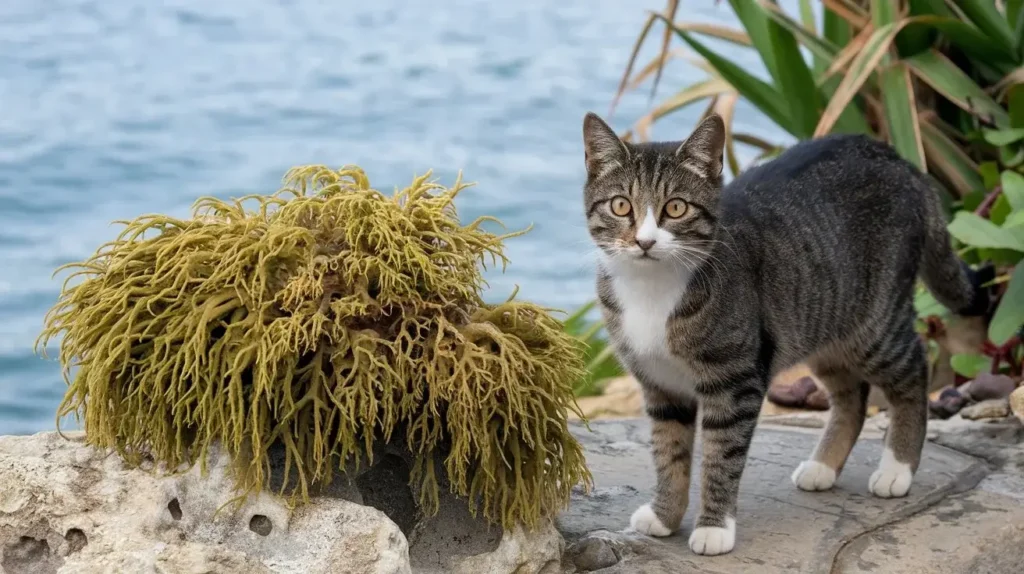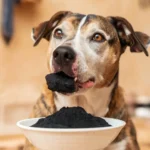As cat owners, we’re constantly exploring new ways to enhance our feline friends’ diets. Consequently, you might be wondering, “Do cats like sea moss?” While this marine plant has gained popularity in human health circles, its appeal to our furry companions remains a topic of curiosity. Therefore, let’s dive into this oceanic subject and explore whether cats have a taste for this nutrient-rich seaweed.
The Feline Palate: Understanding Cat Food Preferences
The fact that cats like sea moss can, in itself be determined by the predispositions in their diet. An obligate carnivore is largely designed to thrive on animal-based proteins. The taste for such a diet and digestive systems are then aligned for said meat-based diets. This, however, does not mean that they will never be interested in other foods.
Factors Influencing Feline Food Choices
Several elements can impact a cat’s willingness to try new foods:
- Firstly, cats have fewer taste buds compared to humans, but they can detect bitter, sour, salty, and umami flavors.
- Secondly, many felines are particularly sensitive to food texture, which can significantly affect their willingness to try new items.
- Lastly, individual personality and past experiences play a role in shaping a cat’s food preferences.
Given these factors, while sea moss isn’t typically part of a cat’s natural diet, some felines might show interest due to its unique texture or smell.
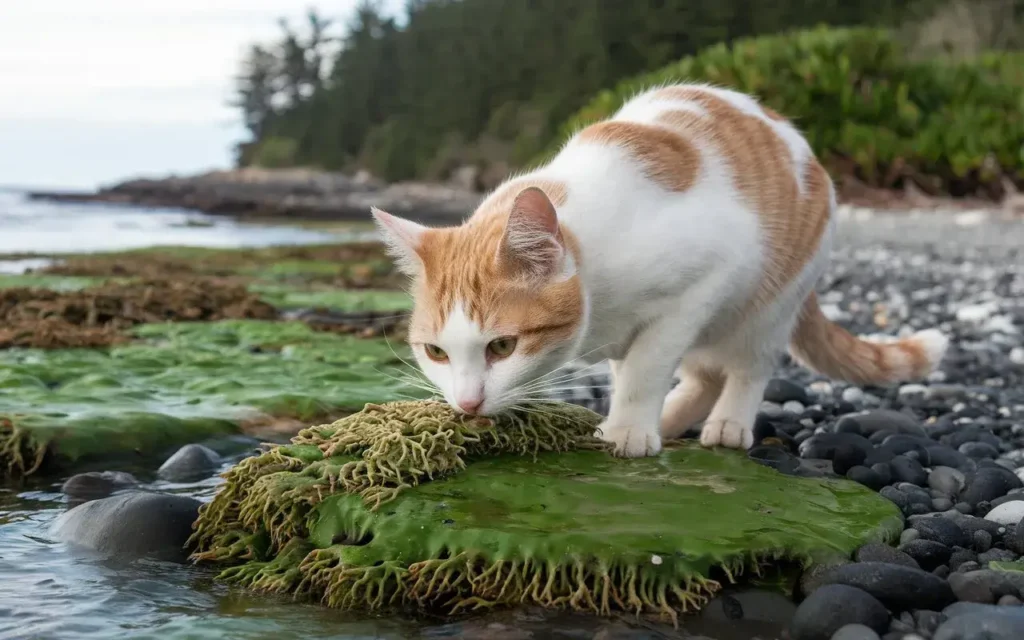
Potential Benefits of Sea Moss for Cats
Although cats may not naturally gravitate towards sea moss, there are potential health benefits that might make it a worthwhile addition to their diet:
- To begin with, sea moss is rich in various vitamins and minerals that can support overall feline health.
- Furthermore, its mucilaginous nature might aid in digestion and hairball prevention.
- Additionally, the high collagen content in sea moss could potentially benefit cat with joint issues.
Nevertheless, it’s important to note that while sea moss offers these potential benefits, cat can obtain necessary nutrients from their regular diet and veterinarian-approved supplements.
Introducing New Foods to Your Cat’s Diet
If you’re considering adding sea moss to your cat’s menu, here are some steps to follow:
- First and foremost, always consult with your veterinarian before introducing new foods to your cat’s diet.
- Secondly, start with small amounts to gauge your cat’s reaction.
- Thirdly, observe carefully for any signs of allergic reactions or digestive upset.
- Lastly, ensure the sea moss is clean and properly prepared before offering it to your cat.
Remember, even if sea moss is safe for cats, it should never replace their regular, balanced diet.
Various Forms of Sea Moss for Cats
The form in which sea moss is presented can significantly impact a cat’s interest. Here are some options:
- Initially, most cats are unlikely to show interest in raw, dried sea moss.
- On the other hand, some cats might be intrigued by the gel-like consistency of hydrated sea moss.
- Alternatively, mixing sea moss powder into wet food might be more palatable for cats.
- Finally, commercially prepared sea moss treats designed for cats might be more appealing.
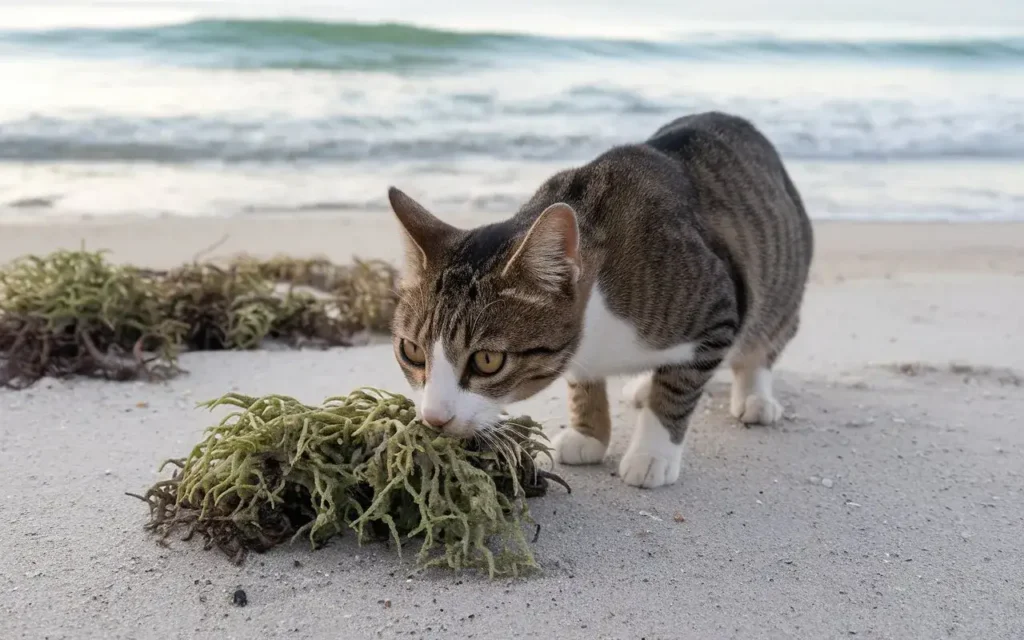
Examining Feline Reactions to Sea Moss
By considering all the above-mentioned aspects, we would be in a position to infer that though some cats might be attracted towards sea moss, as a whole, cats do not have any fascination for this particular type of food. Now, whether cats like sea moss or not is not a definite answer. Each cat is different, and their preferences can be pretty wide.
Individual Differences in Cat Preferences
Several factors can influence whether a cat might like sea moss:
- For instance, some cats are more adventurous eaters than others.
- Moreover, cats introduced to diverse foods early in life might be more open to trying sea moss.
- Furthermore, a cat’s health status might influence their inclination to try sea moss.
- Lastly, the preparation method can significantly impact a cat’s interest in sea moss.
Alternative Nutrient Sources for Cats
If your cat doesn’t show interest in sea moss or you’re looking for other nutrient-rich options, consider these alternatives:
- For example, fish oil is a great source of omega-3 fatty acids.
- Additionally, probiotic supplements can aid in digestive health.
- Moreover, bone broth provides collagen and other nutrients.
- Lastly, nutritional yeast is a good source of B-vitamins and protein.
Always introduce new foods or supplements gradually and under veterinary guidance.
Safety Considerations for Feline Sea Moss Consumption
While exploring whether cats enjoy sea moss, it’s equally important to address safety concerns:
- Firstly, sea moss is high in iodine, which can be harmful to cats in large amounts.
- Secondly, there’s a risk of contamination with heavy metals or other pollutants if not sourced properly.
- Thirdly, some cats may be allergic to sea moss or other seaweeds.
- Lastly, introducing any new food can potentially cause digestive upset in cats.
Expert Opinions on Feline Sea Moss Consumption
To further explore this topic, let’s consider what veterinary professionals have to say:
- On one hand, many vets acknowledge the nutritional benefits of sea moss but emphasize that cats can obtain these nutrients from their regular diet.
- On the other hand, some veterinarians may recommend sea moss as a supplement for specific health conditions, but this is on a case-by-case basis.
- Moreover, if sea moss is given to cats, it should be in very small amounts and not as a dietary staple.
- Lastly, vets stress the importance of considering each cat’s individual health needs and preferences.
Sea Moss in Feline Nutrition
While investigating whether cats have a preference for sea moss, it’s crucial to understand its potential role in feline nutrition:
- First and foremost, sea moss is rich in minerals like iodine, potassium, and magnesium.
- Additionally, it contains vitamins A, C, and E, which can support immune function.
- Furthermore, the fiber in sea moss might aid in digestive health.
- Lastly, the high water content in hydrated sea moss can contribute to a cat’s hydration.
However, it’s important to note that while these nutrients are beneficial, cats are adapted to obtain most of their nutritional needs from animal-based sources.
Feline Interest in Sea Moss-Based Products
As the popularity of sea moss grows, various sea moss-based products for pets have entered the market. Let’s explore whether cats might show more interest in these:
- Firstly, some companies have developed sea moss-infused treats specifically for cats.
- Secondly, powdered or liquid supplements are designed for easy addition to cat food.
- Lastly, some premium cat food brands have started incorporating sea moss into their formulations.
While these products might make it easier to introduce sea moss to cat, remember that individual preferences vary greatly.
Observing Your Cat’s Response to Sea Moss
If you decide to offer sea moss to your cat, careful observation is key. Here are several indicators to keep an eye out for :
- Initially, observe your cat’s level of interest – do they approach the sea moss with curiosity or ignore it completely?
- Next, watch for sniffing behavior, as cats often investigate new foods by smell first.
- Additionally, some cats might give sea moss a tentative lick or small taste.
- Furthermore, if your cat actually consumes the sea moss, observe how much they eat and how eagerly.
- Lastly, watch for any changes in behavior, appetite, or litter box habits after consuming sea moss.
Impact of Age and Health on Feline Sea Moss Preference
A cat’s age and health status can significantly influence their food preferences, including their potential liking for sea moss:
- To begin with, kittens are generally more open to trying new foods but require a balanced diet for growth.
- In contrast, adult cats may have established food preferences and be less inclined to try sea moss.
- Moreover, senior cats might benefit from the nutrients in sea moss but could be more resistant to dietary changes.
- Lastly, cats with certain health conditions might find sea moss more appealing or necessary as a supplement.
Cultural Perspectives on Feline Sea Moss Consumption
Interestingly, cultural and geographical factors might influence whether cats show interest in sea moss:
- For instance, cats in coastal regions where seaweed is a common part of the human diet might have more exposure to sea moss.
- Additionally, in some cultures, seaweed is used in traditional veterinary practices, potentially influencing cat owners’ willingness to offer sea moss to their pets.
- Furthermore, as sea moss gains popularity worldwide, more cat owners are considering it as a potential addition to their pets’ diets.
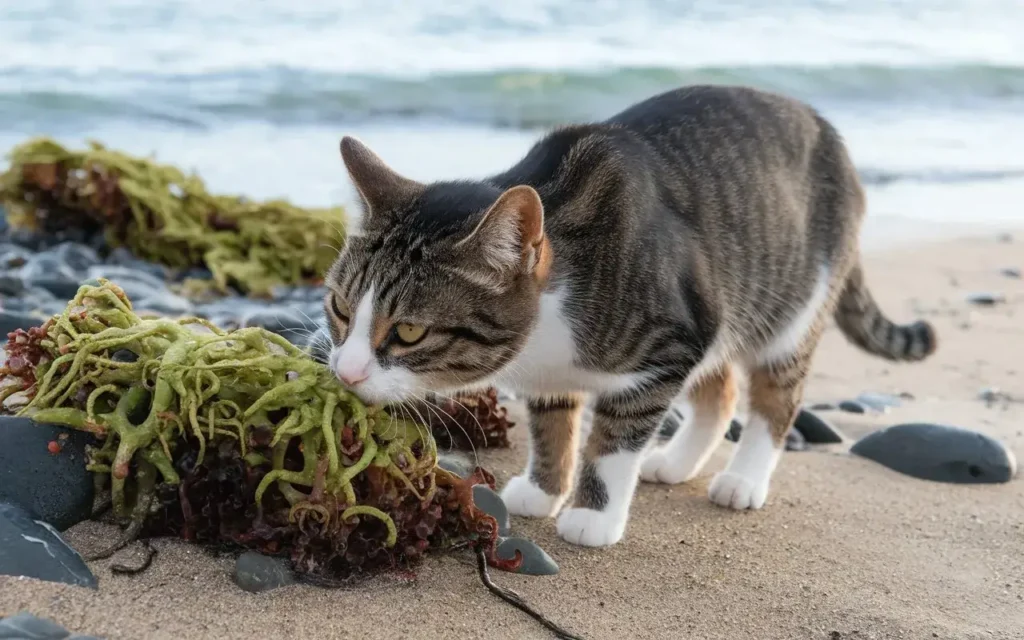
Future of Sea Moss in Feline Nutrition
As research into pet nutrition continues, the role of sea moss in cat diets may evolve:
- Firstly, scientists are continuously studying the effects of various foods, including sea moss, on feline health.
- Secondly, we may see more cat-specific sea moss products in the future, designed to appeal to feline tastes.
- Lastly, as more data becomes available, veterinary advice regarding sea moss may become more definitive.
Conclusion: The Sea Moss and Cat Conundrum
In conclusion, the question of whether cats enjoy sea moss doesn’t have a simple yes or no answer. While sea moss offers potential health benefits, cats’ individual preferences vary greatly. Some cats might show interest in sea moss, while others may completely ignore it.
As responsible pet owners, it’s crucial to prioritize our cats’ overall health and well-being. If you’re considering adding sea moss to your cat’s diet, remember these key points:
- First and foremost, always seek professional advice before making dietary changes.
- Secondly, introduce sea moss in small amounts and observe your cat’s reaction.
- Additionally, if your cat doesn’t like sea moss, there are other ways to provide similar nutrients.
- Lastly, sea moss should never replace a balanced, species-appropriate diet for cat.
Of course, sea moss may not prove to be the treats of choice for every cat. Still, the exploration of new and safe food options is a rewarding process for cats and their owners alike. Whether or not your feline friend will become the sea moss lover is irrelevant because the process leading up to the discovery is part of the fun of owning a cat in the first place.

